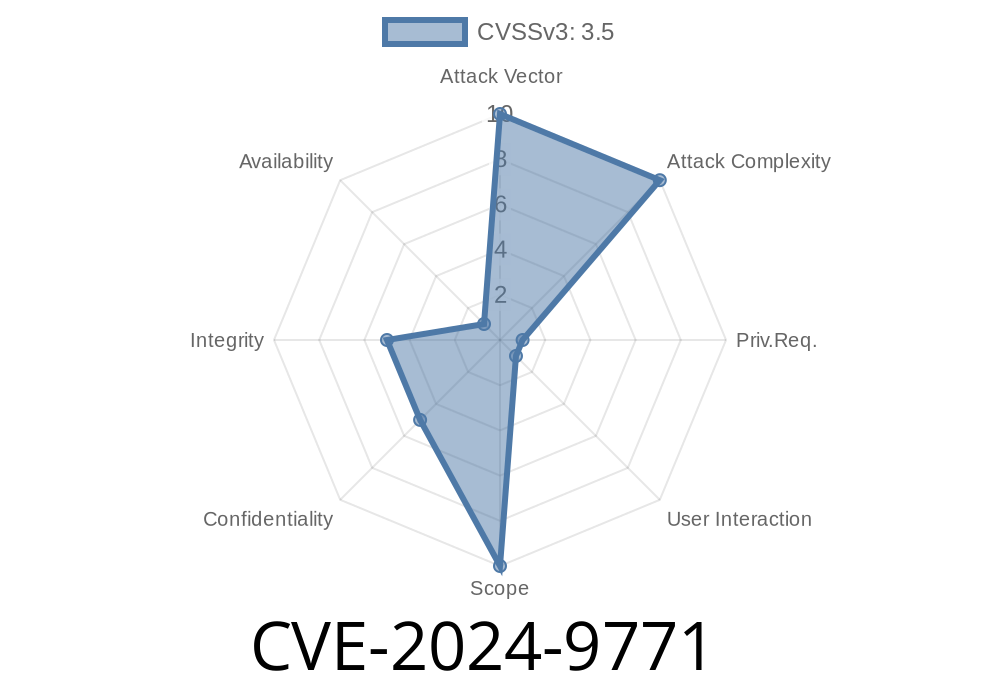A significant security bug, tracked as CVE-2024-9771, was discovered in the popular WP-Recall WordPress plugin. This vulnerability affects all versions before 16.26.12. What makes this bug particularly serious is that it allows privileged users, including admins without the unfiltered_html capability (as is common in WordPress multisite environments), to exploit a Stored Cross-Site Scripting (XSS) vulnerability.
Let’s break down how this works, what the risks are, and how you can protect your site.
What is WP-Recall?
WP-Recall is a popular WordPress plugin used to create personal cabinets, social components, and more on WordPress websites. Due to its popularity, vulnerabilities in this plugin can impact a large number of WordPress sites.
What’s the Issue?
Like many XSS vulnerabilities in the WordPress ecosystem, the problem in WP-Recall is improper sanitizing and escaping of user-supplied inputs — *even when that user is an admin*. Normally, high-privileged users such as admins are permitted to enter raw HTML and JavaScript via the unfiltered_html permission. But in WordPress multisite setups, this capability is disabled by default as a precaution.
WP-Recall, however, failed to properly sanitize some of its settings fields, so even with this restriction in place, an admin could inject malicious code.
Attacker Profile
- Must have a high-privilege user account (e.g., admin, or a role with access to WP-Recall settings).
Navigates to WP-Recall settings (various options under the plugin’s configuration).
3. In a vulnerable setting field (e.g., site’s social link, custom HTML field), the attacker enters a payload such as:
`html
This script is not sanitized and gets saved in the plugin’s settings.
5. Every admin page load (or wherever the field is rendered), the payload executes in any user’s browser (including other admins and super-admins).
Example Exploit
Let’s suppose there’s a settings section in WP-Recall like “Contact Info” or “Custom HTML for Profile.” The code responsible for rendering this field might look like:
echo get_option('wpr_custom_html'); // NO escaping!
An attacker could set the option’s value to
<img src="x" onerror="alert('XSS in WP-Recall!')">
Every time the page is loaded, all other high-privilege users will see a popup — proof that the stored JavaScript now runs in their browsers.
`html
Save the changes.
5. Reload the profile page or the admin dashboard area that displays this field. You should see the JavaScript alert box.
> Note: In a true attack, a malicious script could do much more harm, like stealing cookies, session tokens, or even redirecting users.
Why This Matters: Real-World Risk
- Privilege Escalation: In WordPress multisite, an ordinary “site admin” can attack a “super-admin.”
- Account Takeover: Malicious JavaScript can steal authentication cookies, leading to full account takeover.
- Malware Distribution: Inject malicious scripts that serve spam or phishing pages to other admins or users.
Mitigation
- Update WP-Recall to at least version 16.26.12. This version properly escapes and sanitizes these settings.
Review site admins and remove unnecessary admin accounts, especially in multisite setups.
- Regularly monitor all plugin updates and subscribe to vulnerability feeds such as WPScan or Patchstack.
In updated versions, the plugin authors patch the bug by applying escaping functions
echo esc_html(get_option('wpr_custom_html'));
// or for URLs:
echo esc_url(get_option('wpr_social_link'));
Whenever user input is output on the page, sanitize on input, escape on output.
References
- Original WordPress plugin page
- WPScan Entry for CVE-2024-9771
- Patchstack advisory on CVE-2024-9771
- Common WordPress XSS Patterns
Conclusion
CVE-2024-9771 is a great reminder that even trusted admins aren’t always safe — especially in WordPress multisite environments where the “unfiltered_html” capability is restricted. Vulnerabilities in popular plugins affect millions of sites, so timely updates and code reviews are essential.
If you’re a site admin using WP-Recall, update as soon as possible, and double-check your security hygiene. Don’t let a simple HTML field be your biggest weakness!
Timeline
Published on: 04/28/2025 06:15:16 UTC
Last modified on: 04/29/2025 21:09:36 UTC
